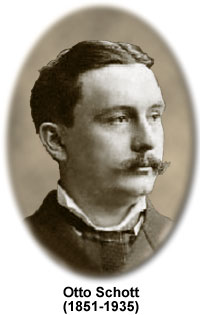Otto Schott
(1851-1935)

Otto Schott, a glass chemist and manufacturer, was born in Witten, Germany on December 17, 1851. He is considered a leading pioneer in modern glass chemistry due to his creation of a variety of high quality glass for the optics industry. Schott's career choice was fitting, for he came from a family of glassmakers. A master at making window glass, his father became a co-owner of a glassworks in Westphalia in 1853.
From 1870 to 1873 Schott studied chemical technology at the technical college in Aachen and at the universities of Wijrzbur and Leipzig. He received his doctorate for work on defects in window glass manufacturing at the University of Jena in 1875. Two years later, at the age of 26, Schott built an iodine and saltpeter factory in Oviedo, Spain.
Near the end of 1879, Schott wrote Ernst Abbe about his success in formulating a lithium-based glass that possessed different optical properties than the normal types then in use. The new formulation provided Abbe with glass materials characterized by a broad gradation of optical characteristics. Following the shipment of a sample of his smelted lithium glass to Abbe, the pair joined Carl Zeiss to form the firm then known as Schott and Associates Glass Technology Laboratory, in Jena, Germany in 1884. By July 1886, the firm produced new kinds of lenses featuring optimal refractive indexes and dispersion. These apochromatic lenses eliminated chromatic aberrations and brought the resolving power of optical instruments to their modern limits.
Between 1887 and 1893, Schott developed borosilicate glass, distinguished for its high tolerance to heat and a substantial resistance to sudden changes in temperature and exposure to chemicals. He utilized the material to make a variety of items, including thermometers, laboratory glassware, pharmaceutical tubing, vials, a brand of domestic glassware called "Jenare Glas," and lamp cylinders for gas lighting. Schott's heat resistant cylinders were particularly valuable for Auer incandescent gas lamps, which were first sold in 1894. The lighting technology was so popular, that the increased demand for borosilicate glass caused Schott's company to quickly become an industrial power, the profits of which increasingly came from exporting its goods to other parts of the world.
Often involved in social concerns, Schott was a member of the Jena city council from 1896 to 1899 and was heavily engaged in important developmental decisions. He was also a supporter of various institutions, such as the University of Jena, and charities, frequently donating money from his personal resources. The city honored him for his contributions in 1908 and Schott retired from his management duties in the glass company in 1926. The man who is often regarded as the founder of modern glass science and technology passed away in 1935.
